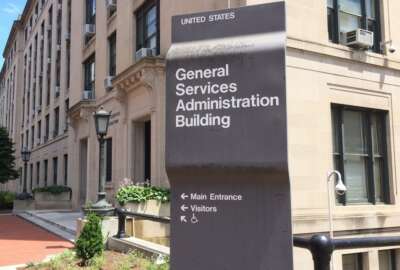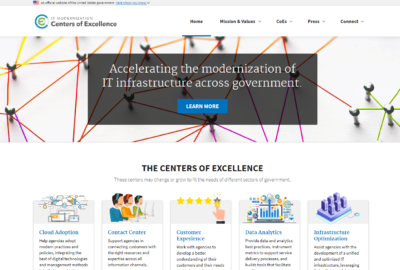
GSA releases RFQ for Centers of Excellence model to ‘deliver results far more easily’
The General Services Administration has released a request for quotation for Phase One of its Center of Excellence discovery services, laying the groundwork for GSA...
The General Services Administration has released a request for quotation for Phase One of its Center of Excellence discovery services, laying the groundwork for GSA to set up CoEs at new partner agencies.
Rather than rely on one contract for the discovery work at each agency, the blanket purchase agreement aims to allow GSA to find the vendor that best fits each agency’s unique needs.
“This BPA is intended to account for each future CoE Agency Partner by offering a means of initial and continuous discovery work, by Center need, considering the various different factors, influences, and context that apply to each Agency Partner’s organizational transformation needs,” the RFQ states.
The request, which was released Monday, comes about a month after GSA gathered industry feedback from its request for information.
Related Stories
The RFQ also allowed vendors to respond to just one of the CoE focus areas, rather than a minimum of three, as previously proposed.
“By using multiple-award contracts in each of the Center of Excellence areas, we’re going to be able to have a much quicker acquisition vehicle in place and be able to deliver results far more easily,” GSA Administrator Emily Murphy said Tuesday at ACT-IAC’s Acquisition Excellence conference.
The Trump administration first rolled out the CoE model at the Agriculture Department in December 2017, then the Department of Housing and Urban Development last September.
The RFQ is open for questions until March 19 and open for responses until April 1.
Innovation key part of culture
Murphy said GSA plans to expand the agencies they’re working with on CoEs “in the near future.” She added the CoE initiative demonstrates steps taken in making innovation a key part of the agency’s culture.
“It’s easy in procurement to get very conservative and want to get the protest-proof procurement out the door, when it might not actually be the right solution. It might not be the right innovation. And GSA hasn’t been afraid of opening that door in the past,” Murphy said.
As part of that culture of innovation, GSA has become an early adopter of robotic process automation in government, setting up pilots aimed at reducing the burden on agency acquisition officials.
The Public Building Service, with two active bots, has used RPA to save about 10,000 labor hours.
“It means that GSA employees are doing higher-value work, and we’re able to free up our 1102’s and our contracting workforce to focus on higher value, rather than doing data entry and repetitive tasks,” Murphy said.
Murphy also highlighted the Federal Acquisition Service’s ongoing schedule consolidation efforts. Before the end of the summer, she said GSA would finalize the terms and conditions necessary to move from its 24 schedules to one schedule.
Last November, GSA announced it would consolidate those 24 schedules by the end of 2020.
“Agencies can find what they want to buy. Vendors can more easily list what it is that they have to sell, and by consolidating into one schedule, you can buy a solution rather than just a product or a service,” Murphy said.
The consolidation of schedules marks one of four “cornerstone” modernization initiatives GSA has in the works. The others include modernizing its contract writing system, catalog management and commercial platforms.
“We want to test new approaches, but we want to make sure we understand as much as we can about the risks we’re undertaking and what benefits we expect to get,” Murphy said.
Copyright © 2025 Federal News Network. All rights reserved. This website is not intended for users located within the European Economic Area.
Jory Heckman is a reporter at Federal News Network covering U.S. Postal Service, IRS, big data and technology issues.
Follow @jheckmanWFED





